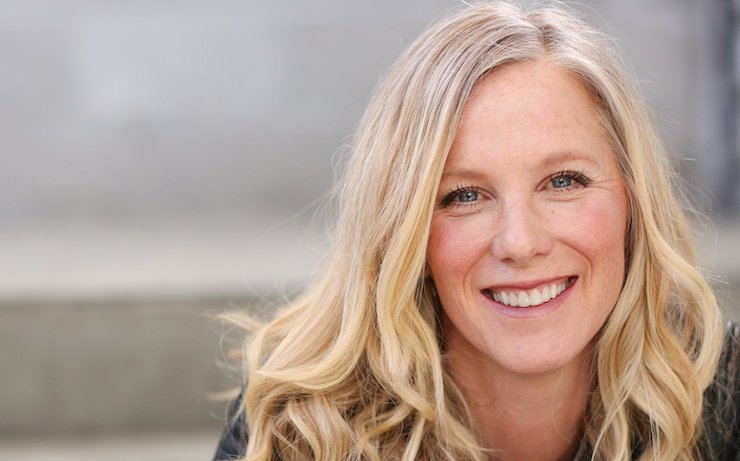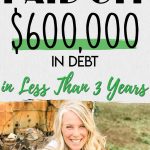How She Paid Off $600,000 in Debt in Less Than 3 Years
Some products in this article are from our partners. Read our Advertiser Discloser.


How did you acquire nearly $600,000 in debt? What did that debt consist of?
I had $571,817.68 in debt, and I paid it all off in less than three years.
In January 2009 – my debts in order of highest to lowest:
$385,452.12 – Mortgage on my house
$146,191.47 – Mortgage on my rental property
$12,550.75 – Equity line on house
$10,412.01 – United Mileage Plus credit card
$9,831.32 – MBNA credit card
$7,380.01 – my car loan to Subaru
What did it feel like to have that much debt?
Honestly, I was so removed from my relationship with money, that being in debt didn’t really mean anything to me. I knew I wasn’t “supposed” to be in debt – but I didn’t equate debt with real money.
I didn’t equate debt with what it would mean to actually pay it off. Therefore, I didn’t really have a true “feeling” about being in debt.
I had resigned myself to living in some amount of debt for the rest of my life. I thought debt was simply part of adult life. I only focused on monthly payments, and up until 2009, I was able to pay my bills easily.
I had no concept of what money really meant – I only knew what I brought in per month and what I paid out per month. I had a very removed relationship with money, so being $10 in debt or a half million dollars in debt made no difference to me until the perfect storm of 2009 showed up.
Three things happened in 2009 that woke me up and helped me understand what my debt really meant. The first was getting a divorce and needing to sell off our properties after the housing bubble burst.
I had always paid my bills and had always kept my commitments, but the real estate market was falling and my assets became huge liabilities. It seems obvious now, but at the time, I really only thought of my mortgage as a monthly bill.
But, after dropping the sale price well below what I owed and having additionally lost the $200k that I invested in my properties – I got a huge dose of reality as I needed to come up with $50k to pay off the loan so that I could sell my house.
The second lesson of 2009 was also a byproduct of the divorce. Up until that point, my coaching career had been unstoppable.
I had been on Oprah, I was in the middle of putting together a book deal – life was good. And then, life fell apart and I fell apart and with it. My coaching career fell to almost nothing, I was in crisis and really had nothing to offer to my clients and my students.
The third lesson of 2009 was that I had previously sold a business and had carried the loan myself. The financial crisis hit the buyer hard, and he was unable to continue paying on the loan.
We settled for a nominal fee and I wrote off the balloon payment that I had hoped to receive that year.
So, between losing big-time in real estate, losing a substantial piece of my current income and losing my business sale income, I found myself staring straight at what I really owed and realized for the first time that this was a real number.
It was a real amount of money that I had to pay back. Up until that point, I was basically just moving debt around. I still wasn’t taking responsibility for how I was spending or what I was earning.
I had made some difficult choices – but I hadn’t completely committed to being debt free or to living a cash-based life.
It wasn’t until the end of 2009 that I really realized what I had done to myself and realized the enormity of living beyond my means for so many years.
I finally realized the truth about the dysfunctional relationship I had with money and faced up to my habit of minimizing and justifying and pretending.
It took losing my ass on both of my houses, being broke for a year, waiting to be saved by a balloon payment and then realizing that it was gone too. The reality of what I owed and what I was going to need to do to turn my financial life around finally hit me.
I made a vow. I committed to stop using credit cards, to stop “renting” money, to live within my means and pay off debt. For real this time. I made a commitment to myself to get out of debt and never go back.
The first month is always the hardest. I completely stopped using rented (aka: credit cards) money and began paying for my past AND my present.
This is when my Radical Debt Eradication plan came into place. I sold everything that I could sell. Furniture, handbags, clothes, jewelry etc. and put the cash towards my debt. I started working 3 jobs – and made a commitment to keep working like a mad woman until my debt was paid off.
I lowered my overhead, eliminating as much as possible from my monthly expenses. I completely changed my relationship with money, using the tools that I wrote about in my book Money Love.
I liquidated my retirement accounts, paid the tax penalty and used the rest to pay off debt. For the remainder of the balances, I made payments of $3000 to $5000 a month until they were paid off. I did this every single month.
I could have taken a vacation to a tropical resort or bought a new MacBook Pro with the amount of money that I was spending trying to clean up my past self’s irresponsible choices.
How long did it take you to pay it all off?
Three years.
What resources did you use to help you through this process?
I used Ramsey’s snowball method which helped me start. My biggest resource was my own research and what I learned through sharing my work with my clients and readers.
I created tools for myself and began sharing them with my clients and eventually wrote a book based on the experience called Money Love.
Did you face any challenges along the way?
There were many months where it seemed daunting. Maybe even impossible or never-ending. There were months where huge unforeseen expenses showed up.
A car engine that blew up and the subsequent 3-month-stay in a repair shop. A custody battle. Attorneys fees. Things that I would have previously charged without even blinking.
This time, though, credit wasn’t an option. And without that option, I found that I was way stronger and way more resourceful than I had ever given myself credit for. I hustled.
I worked my ass off. I stayed true to my vow. I stayed loyal to my commitments, and it worked. I paid every dime of that debt off.
What were you doing for a living while you were paying off the debt?
Primarily I coached others and made money by blogging. I also taught piano and got a job with Apple.
How did it feel once you paid it all off?
I’ve been debt free since November 2011. At first, it was funny. I kept catching myself habitually thinking “I have to pay for this. I have to pay for that.”
Running the calculations in my head like I had done for the past few years. And then I’d smile and realize I had already paid everything off. It was over.
I was in some form of debt for nearly 20 years. And then for three years of my life, I was dedicated to radical debt eradication. I didn’t realize it at the time – but the debt was kind of like my baby. I thought about it constantly.
I would always strategize about how to pay it down. I would run numbers in my head. I had a running calculation every time I spent money or made extra money. I was obsessed.
This wasn’t necessarily a bad thing. It kept me passionate. It kept me focused. It provided momentum and motivation. For years. And then all of a sudden it was over.
Being debt-free didn’t feel like what I had imagined. Nothing was left. There were no more money problems to be solved. I didn’t owe anything anymore.
There was such a foreign sense of relief. And, at the same time, there’s a sense of confusion – almost a lack of identity.
I wasn’t expecting that experience on the other side of debt. I was expecting huge relief. A feeling of abundance and freedom.
And don’t get me wrong: Those were there too, but what I really felt like…was I had just landed at the arrival gate for a fabulous trip. And I had lost my luggage.
There’s a thrill about having everything gone. Knowing that I can replace it all with new bright and shiny things. I could replace the old faded sundresses. And the pair of heels with nicks on the straps.
I could replace the worn out sweater. The jacket that’s been washed too many times.
But, there’s a sense of strange loss. Even when you lose things that you don’t want anymore. These things had defined me. They were my story for so long. And then they were gone, and I had lost them on purpose.
I had set myself free to find a new story. Free to choose my own life.
I did not need this luggage… I didn’t even want it. I was just so used to carrying it. And for the first time – I was allowed to put it down. Leave it behind. And walk straight into my future.
What I’ve realized: I lost my luggage. On purpose. And I am free to travel without my old shoddy past. I am free to choose new things. I am free to choose new stories. I am free to travel without baggage. And that is sweet freedom.
What practical tips do you have for people looking to pay off their debt?
I believe the way you interact with money is inseparable from your core beliefs about life itself. Your relationship with money reflects your feelings about love, fear, anger, purpose, abundance, life, worthiness and even God.
So, I think it’s important to understand that money work takes you to the deepest part of yourself. It’s important work. It’s spiritual work. It’s not simply about paying bills. It is so much more than that. It’s about your relationship with yourself and your awareness of your own experience.
If you can, I recommend hiring a coach or working a do-it-yourself program that helps you understand your relationship with money, such as my Money Love School course.
To learn more about Meadow, you can go to meadowdevor.squarespace.com


This article tells us how she accumulated so much debt and provides us an itemized list of all her debts. It also tells us that she used her retirement fund to pay most of it off. I would like to know how old she was in 2009 and what her profession is or was at the time.
Wow! Great work killing all that debt in such a short period of time.
Cheers!